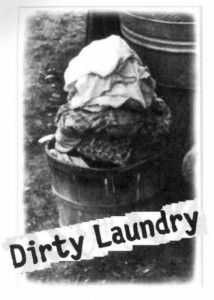Dirty Laundry: 100 Days in a Zen Monastery
Robert Winson and Miriam Sagan
La Alameda Press: Albuquerque, 1997
200 pp., $14.00 (paper)
On New Year’s Day 1992, a Zen priest named Robert Winson and his wife, the poet Miriam Sagan, packed up the car and drove with their three-year-old daughter from Santa Fe to Crestone, Colorado, where Winson was to spend the next three months in a monastic retreat with his teacher, Richard Baker Roshi. That same day, at Sagan’s suggestion, Winson and Sagan each began keeping a diary, which they lightly edited for each other’s perusal. Their collaboration ripened into a remarkable record, a raw and unflinchingly honest account of their day-to-day struggle to make their relationship work while coping with the demands of monastic life. It is, as well, a kind of elegy for Winson, who died three years ago at age thirty-six following surgery for ulcerative colitis—a death that is eerily foreshadowed in journal passages describing an illness that he seemed to not want to admit.
Sagan writes in her introduction that Winson “never wanted to be anything but a Zen priest.” But in the course of his life he was also a student of the poet Philip Whalen, publisher of the literary magazine Fish Drum, and, alongside Sagan, a vocalist in a punk-rock band. In his diary entries, Winson attests to the many joys in his life: his love for his wife and daughter, trashy novels, zazen, hot baths and the dramatic mountain scenery surrounding Crestone.
The book abounds with what could be called “Zen gossip”—descriptions of the convoluted relationships among teacher and students—but the real value of these journals is in their power to demystify the monastic experience. Winson’s portrayal of monastic life is harrowing—it is always demanding and often darkly claustrophobic. It snows constantly and is bitterly cold. Students divide into cliques, leading to incessant, muffled infighting. The monastery is a pressure cooker in which peoples’ worst traits surface. Winson reports: “Writing to Philip Whalen yesterday I complained that the conversation here is usually rather guarded and flat, and that the other basics of life are also pinched—anxiety about food, money, short supplies of water, heat, electricity.” He chafes when the meticulous attention that is cultivated during an extended retreat degenerates into dour preoccupation with petty details. “Sometimes I feel I’m practicing a different religion, or a deeply different Buddhism, from the long-term residents,” Winson writes. “They have such an emphasis on purity, rejection of the world and the senses.”
For Sagan, the retreat period settles into a precarious pattern of shuttling between the couple’s home in Santa Fe and the monastery, where she stays for a few days at a time and teaches a writing class. A Zen practitioner but not a student of Baker’s, she feels unwelcome at the monastery, misses her husband, and must cope with being a single parent to their daughter, Isabel. At one point she suggests they both compile lists of things that make them angry. She starts with “things that make me angry at the monastery: being cramped in one room; other peoples’ bad vibes; limited access to laundry; being told what to do; Isabel in a bad mood, demanding; Robert ignoring me; no seasoning on the food.” Another day’s entry contains just two telling lines: “Back to Crestone. Punky feeling of reentry into the place.”
Both writers also fill their journal entries with precise, intimate details of daily experience—dreams, quarrels over money, tears and making up, their sex life and their daughter’s sweetness and precociousness. Finally, the journals chronicle Winson’s decision to part with Baker Roshi, for whom he serves as personal attendant during part of the retreat. Baker appears here as a contradictory, sometimes intimidating figure, constantly exhorting his student to be more “precise,” but unwilling or unable to still the discord at the monastery. The reader is left wondering whether this rampant strife among the residents is intended to be a kind of teaching as the roshi pushes his students to confront and release their attachments, or is simply garden-variety dysfunction run riot. Winson finally concludes the latter and confronts Baker with his feelings, declaring, “This is a sick and ailing community.” Later, he feels his teacher is retaliating for his truth-telling and one afternoon finds himself kneeling on a tarp in the snow flailing an aspen trunk with sticks while visualizing Baker Roshi. Yet Winson is relieved after formally severing his relationship with Baker, and writes, “More at ease here not being Roshi’s student. No big changes yet. Been avoiding him just by not making any effort to see him; I’m sure it shows.”

Thank you for subscribing to Tricycle! As a nonprofit, we depend on readers like you to keep Buddhist teachings and practices widely available.